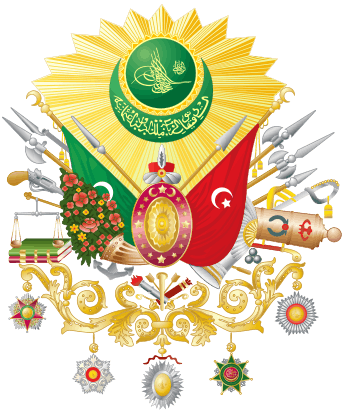Hayranidil Kadın
| Hayranidil Kadın | |
|---|---|
| Born |
2 November 1846 Kars, Caucasus |
| Died |
26 November 1898 (aged 52) Ortaköy, Istanbul, Ottoman Empire |
| Burial | Sultan Mahmud II mausoleum, Çemberlitaş, Fatih, Istanbul |
| Spouse | Abdülaziz |
| Issue |
Nazime Sultan Abdulmejid II |
| House | Ottoman (by marrige) |
| Religion | Sunni Islam |
Hayranidil Kadın (Ottoman Turkish: خیراندل قادین; 21 November 1846 – 26 November 1895), meaning 'The excellent heart',[1] was the second wife of Sultan Abdülaziz of the Ottoman Empire.
Early life
Of Circassian origin, Hayranıdil Kadın was born on 21 November 1846 in Kars, Caucasus.[2]
Marriage
Hayranıdil married Abdülaziz in 1861 in the Dolmabahçe Palace, after his accession to the throne. She was given the title of "Ikinci Kadın".[3] Five years after the marriage, on 25 February 1866, she gave birth to her first child, a daughter, Nazıma Sultan,[4] and two years later on 29 May 1868, she gave birth to her second child, a son, Şehzade Abdulmejid (future Caliph Abdulmejid II).[5]
Hayranıdil was celebrated as the most beautiful woman of the imperial household.[6]
Abdülaziz was deposed by his ministers on 30 May 1876, his nephew Murad V became the Sultan.[7] He was transferred to Feriye Palace the next day.[8] Hayranıdil, and other women of Abdülaziz's entourage didn't wanted to leave the Dolmabahçe Palace. So they were grabbed by hand and were send out to the Feriye Palace. In the process, they were searched from head to toe and everything of value was taken from them.[9] On 4 June 1876,[10] Abdülaziz died under mysterious circumstances.[11]
Death
Hayranıdil Kadın died on 26 November 1895[12] in the Ortaköy Palace,[13] and was buried in the mausoleum of Sultan Mahmud II, located at Divan Yolu street, Istanbul.[14]
See also
References
- ↑ A Gyre Thro' the Orient. Republican Book and Job Printing Office. 1869. p. 62.
- ↑ Açba 2007, p. 88.
- ↑ Uluçay 2011, p. 232.
- ↑ Uluçay 2011, p. 235.
- ↑ Elsie, Robert (2013). A Biographical Dictionary of Albanian History. A Biographical Dictionary of Albanian History. p. 3. ISBN 978-1-780-76431-3.
- ↑ Gülersoy, Çelik (1990). Dolmabahçe Palace and it's environs. İstanbul Kitaplığı. p. 131.
- ↑ Zürcher, Erik J. (October 15, 2004). Turkey: A Modern History, Revised Edition. I.B.Tauris. p. 73. ISBN 978-1-850-43399-6.
- ↑ Shaw, Stanford J.; Shaw, Ezel Kural (1976). History of the Ottoman Empire and Modern Turkey: Volume 2, Reform, Revolution, and Republic: The Rise of Modern Turkey 1808-1975, Volume 11. Cambridge University Press. p. 164. ISBN 978-0-521-29166-8.
- ↑ Brookes 2010, p. 40.
- ↑ Davison, Roderic H. (December 8, 2015). Reform in the Ottoman Empire, 1856-1876. Princeton University Press. p. 341. ISBN 978-1-400-87876-5.
- ↑ Brookes 2010, p. 43.
- ↑ Uluçay 2011, p. 233.
- ↑ Açba 2007, p. 89.
- ↑ Sakaoğlu 2008, p. 641.
Sources
- Uluçay, M. Çağatay (2011). Padişahların kadınları ve kızları. Ötüken. ISBN 978-9-754-37840-5.
- Açba, Harun (2007). Kadın efendiler: 1839-1924. Profil. ISBN 978-9-759-96109-1.
- Sakaoğlu, Necdet (2008). Bu Mülkün Kadın Sultanları: Vâlide Sultanlar, Hâtunlar, Hasekiler, Kandınefendiler, Sultanefendiler. Oğlak Yayıncılık. ISBN 978-6-051-71079-2.
- The Concubine, the Princess, and the Teacher: Voices from the Ottoman Harem. University of Texas Press. 2010. ISBN 978-0-292-78335-5.
External links
- "Genealogy of Hayranıdil Kadınefendi". Retrieved 2009-04-13.
